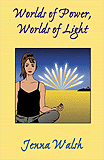
Worlds
of Power, Worlds of Light
By Jenna Walsh
Other Interesting Projects By This Author
Dharma Center Meditation
Center
Interview
With The Author
Why
did you decide to write a book?
I began using writing to help me process different life experiences
when I was 12 years old. The words came out initially in short
poems, and then scenes from a variety of stories started popping
out. I always knew I would write a book, and after reading Carlos
Castaneda, I knew I wanted to write a book like his. I have
a whole crate full of story parts, but nothing even close to
being finished. Meeting and studying with Rama and his students
was the perfect catalyst to get me to stick with the story I
just had to share.
What
did you learn by writing a book?
I’ve heard it many times, but never really believed it
until I got all the way through my first manuscript –
writing a book to share with others is really about re-writing
and re-writing and re-writing… And of course, if you’re
using the computer, save often!
Do
you have any suggestions to help others publish their books?
Determine your target audience. If it’s small, then self-publishing
with an on-demand printing service is probably the best bet.
If your book has mass-market appeal, then you’re best
bet is to find an agent who believes in your work and let him
or her market your book to publishers. Beware of “agents”
who charge a reading fee; if they making money from lots of
authors, there’s not much incentive for them to work at
selling your book to a publisher. Before publishing, always
make sure that your book is the best it can be – have
someone who has little interest in your topic read it, because
that’s the person who will be able to see the holes.
How
do you inspire yourself to write?
I write in a journal on a regular basis – nothing structured;
the purpose is to just get thoughts and ideas that are floating
around in my head on to the paper. Most of the time it’s
just babble, but once in a while, something special does pop
out.
Answering
questions via emails from students also tends to get my creativity
flowing.
I found
a wonderful writer’s group in Ocean Beach that is incredibly
supportive. The woman who runs it has set it up as a mini-class
and workshop. She brings in a poem and an excerpt from a story
that shares a similar theme that we read and discuss. Then we
write for about 15 minutes; we can write on the same theme,
or anything that comes up. Some wonderful pieces have found
their way into my notebook through this process. During the
second half of the meeting, we critique whatever people have
brought in that they’re working on. Participating in the
critique process teaches you ways to improve your own writing.
Do
you have any funny stories about things that happened while
you were writing the book?
Rama worked with his students by having them work on different
projects, and by observing how these projects turned out, Rama
would offer a critique of the student’s level of attention.
The book I wrote was one such project. When I finished the first
draft, I sent it off to Rama. After a week or two, ideas and
corrections for the book would fill my head. We hardly spoke
verbally about the book – but every time I sent him a
copy, I would have all of these things that I just had to change
in the book. It was a very strange process. The critiques would
hit me quite unexpectedly – in the middle of a business
meeting, on the train, etc. I would stop whatever I was doing
and start scribbling. Sometimes it was a bit like being hit
over the head!
Do you have anything else that you would like to add?
When you embark on the long journey of writing a book, let the
story flow out of you completely before you edit. Don’t
worry about the grammar or sentence structure or even the word
choice – get the first draft down on paper. Once it’s
down and you’ve printed or saved a copy, then go in and
begin to edit. Remember that the muse and the editor are different
parts of you, and they don’t always get along –
so don’t make them both look at your story at the same
time!
%20of%20titlemain.gif)
%20of%20titlemain.gif)